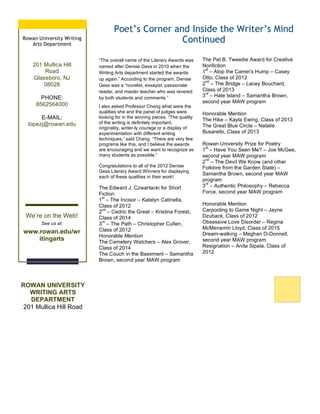The document provides an overview of Scott McCloud's visit to Rowan University as part of the President's Lecture Series, including his engaging presentation about comics and his interactions with students. It also details Dr. Jody Shipka's participation in the Harrah's Emerging Writers Series, where she discusses her writing process and encourages students to experiment. Overall, the content highlights the vibrant literary events and the emphasis on creativity and passion in the writing arts at Rowan University.
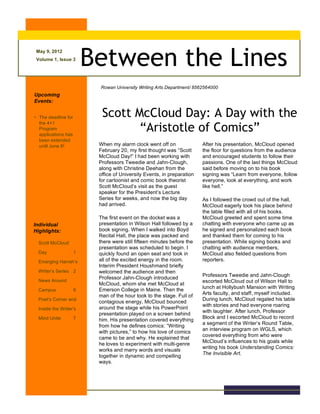
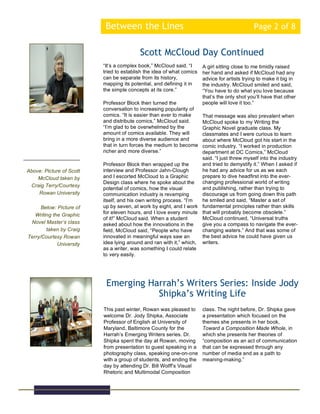
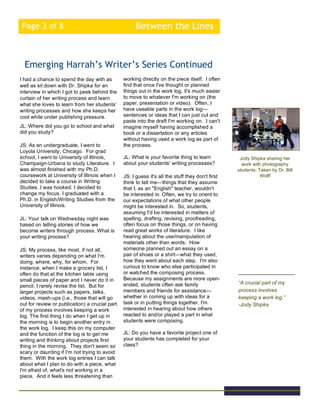
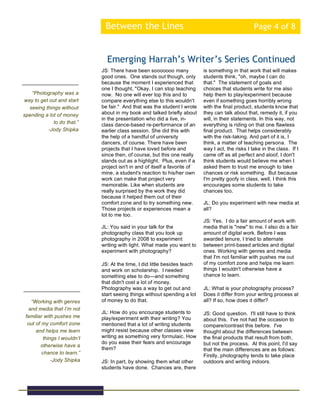
![Between the LinesPage 5 of 8
JS: Secondly, photography feels more
immediate, spontaneous, and intuitive
while writing always feels or seems more
calculated. I think a lot about what I want
to say/do/communicative before I act
(i.e., make notes, put things on paper).
This is not to say that photography is
mindless. When I go out on a shoot, I
almost always size up the situation,
considering which cameras and films I
might use. But when I see something I
want or need to take a photo of, it feels
immediate. My heart will start beating
quickly—I just know I need to capture
that thing. With writing, I might think of
something quickly, but I'll often (a second
later) convince myself what I just thought
was lame, stupid. I guess there's less
second-guessing with photography. I
just grab an image and worry about its
success later. Then again, the biggest
difference between the two processes is
that I don't make a living with
photography. I can play there and not
worry about how well it will be received
by my peers.
JL: You mentioned with photography you
feel free to experiment. Do you not feel
as though you can "play" as much with
your writing?
JS: I definitely feel like I can play or
experiment with my composing when I'm
working with genres or media I've not
worked with before. But I think the
biggest difference (as I mentioned
above) is that I'm not judged by my
photography in the same way that I'm
judged by my writing. With photography,
I can be, and remain, a perpetual
student—always learning, always
improving, and trying new things. I can
do this with my scholarship too, of
Emerging Harrah’s Writer’s Series Continued
“Try to do a little
something on a project
or assignment every
day—whether it’s
researching for it,
composing a bit of it,
making a tentative
outline.”
-Jody Shipka
course, but I feel like there's an
expectation there, perhaps self-imposed,
to top what I did last. To keep getting
better, smarter, and to make fewer
mistakes.
JL: How do you handle the pressure that
comes with publishing success?
JS: In short, I try to avoid the pressure.
Before getting tenure, I always had a
project or two going at once, so I tried to
focus on doing work I enjoyed rather
than worrying about getting published.
[A mentor once said that if you do work
you enjoy and do it well, you'll stand a
better chance or getting that work
published.] I also don't tend to read
reviews/blog posts and I try not to think
about how others will respond to the
work while I'm working on it. I try,
instead, to focus on what I want to say,
do, communicate and to consider ways
of doing that to the best of my ability--in
ways that will translate to others. There
will always be people who don't think
highly of my work and if I think about
them too much, I start to believe it to.
JL: Do you have any general advice for
student writers?
JS: Yes, definitely: Keep a work log.
Also, try to do a little something on a
project or assignment every day—
whether it's researching for it, composing
a bit of it, making a tentative outline.
This is especially crucial, I think, if the
task or assignment is intimidating. If I do
something everyday, I feel like I remain
in control—that I have the upper hand. If
not, I spend all my time worrying about
and/or feeling guilty about what I'm not
doing!](https://image.slidesharecdn.com/newsletter3may2012-160112022314/85/Between-the-Lines-Issue-3-5-320.jpg)
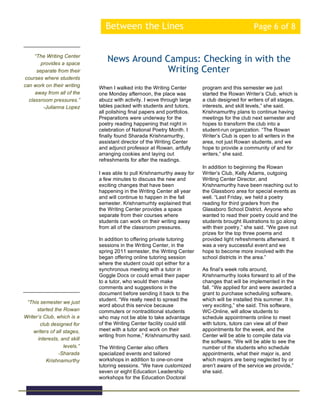
![Between the LinesPage 7 of 8
“Right now, most of our tutors are English
or Writing Arts/MA in Writing students,
and we’re looking to diversify our tutors
as well as better customize our services
for all Rowan students.”
It was clear to see that Krishnamurthy
loves working in the Writing Center and
when I asked her what she loves most
about working here she said, “I sort of
serendipitously fell into working here, but
I love it. When you work with students,
help them better articulate their ideas,
and navigate the direction of their
thoughts, it’s a great thing to witness,”
she said. “It’s exciting to be able to be
helping the community overall write
better.”
I asked what students could do to keep
their writing fresh as summer break
News Around Campus Continued
On Tuesday, April 10, 2012, students,
friends, family, and Writing Arts faculty
convened in the upper level of Rowan’s
Barnes & Noble bookstore to recognize
and celebrate the literary works of the
2012 winners of the Denise Gess Literary
Awards. The Literary Awards, which are
conducted biannually, are according to
the program given out the night of the
readings, “open to all undergraduate and
graduate students enrolled at Rowan”
and were established in order to
recognize “the creativity and literary
achievement of Rowan students.” And
the reading provided the opportunity to do
just that.
Poet’s Corner and Inside the Writer’s Mind
Unite: The Denise Gess Literary Award Winners
“Journaling is great […]
it helps keep the
creative juices flowing
and the writing alive.”
-Sharada
Krishnamurthy
“There are very few
programs like this and I
believe the awards are
encouraging and we
want to recognize as
many students as
possible.”
-Professor Julia Chang
quickly approaches. “Journaling is great
[…] it helps keep the creative juices
flowing and the writing alive,” she said. “It
shouldn’t feel like work. It’s just a way of
expressing your thoughts and organizing
them on paper,” she reiterated. “Reading
is always essential for good writing as
well,” Krishnamurthy said. “You get to see
what other writers are doing and
techniques they’re implementing, and it’s
a great source of inspiration.”
All of the changes the Writing Center
directors and tutors are implementing are
an inspiration as well. For more
information about the Writing Center, visit
their website, contact the Center tutors
via writingcenter@rowan.edu, or stop by
the Writing Center in the fall.
I had the opportunity to briefly sit and talk
with Professor Julia Chang to discuss the
history behind each of the three
categories of the competition: The
Edward J. Czwartacki Award for Short
Fiction, The Pat B. Tweedie Award for
Creative Nonfiction, and the Rowan
University Award for Poetry. “The Pat B.
Tweedie Award was named after a friend
of Professor Tweedie’s mother who made
a gift in her honor. The Edward J.
Czwartacki Award was named for a
Rowan Creative Writing student who
drowned in Ocean City while trying to
save two Amish women who got swept
up in the current because of their skirts,”
said Chang.](https://image.slidesharecdn.com/newsletter3may2012-160112022314/85/Between-the-Lines-Issue-3-7-320.jpg)
